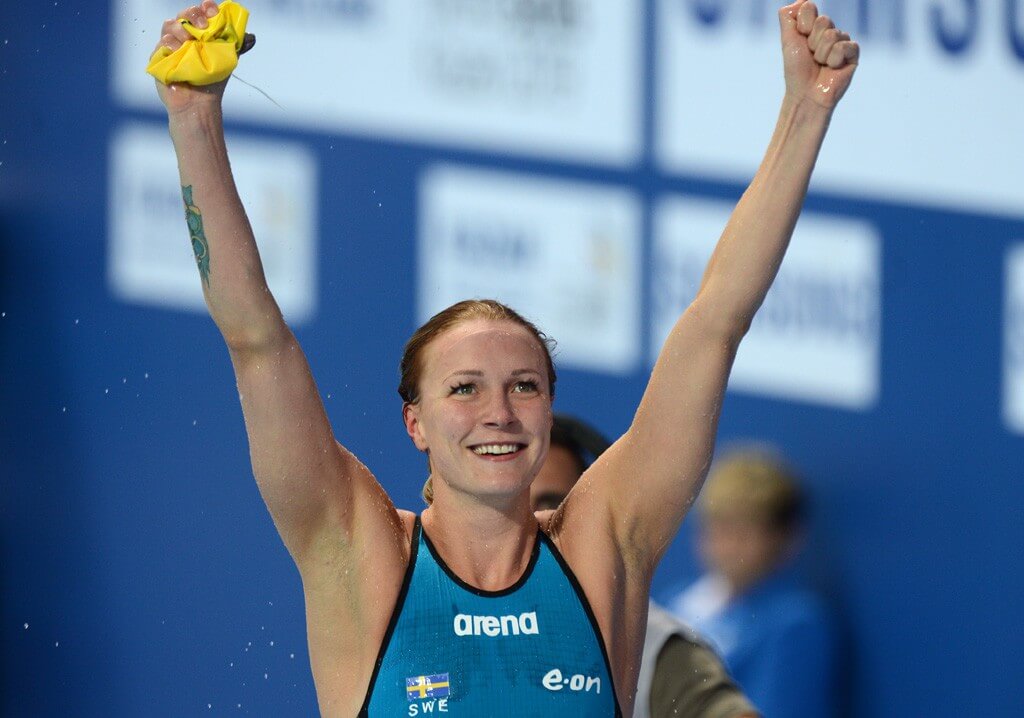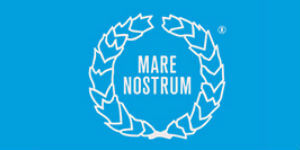Sjostrom Flirts with WR to Close Mare Nostrum

Sarah Sjostrom cemented her status as the headliner of this year’s Mare Nostrum series with a monumental swim in the 100 freestyle on the final night of competition in Canet-en-Roussillon. With her dominating 52.08, Sjostrom very nearly nabbed both the European and World Records–ultimately coming up one hundredth and two hundredths short, respectively. Yulia Efimova made world-class attempts of her own in the 50 and 200 breaststrokes, but Sjostrom stole the crowd with her impressive freestyle and sub-25 50 butterfly.
The meet started off with excitement, as Yulia Efimova won her third title of the series in the 50 breaststroke. Her slow start kept her just shy of a sub-thirty swim and Ruta Meilutyte‘s Mare Nostrum 2013 record of 29.88. Efimova ultimately posted a 30.04 and was trailed by Jennie Johansson of Sweden in 30.77, and Jessica Hansen of Australia in 30.83.
South Africa’s veteran breaststroker, Cameron Van der Burgh, dueled it out with Filipe Lima of Brazil in the men’s event. Lima stayed thick in Van der Burgh’s waves but ultimately could not overcome the two-time (and now three-time) champion of the series. Van der Burgh claimed the first-place trophy in 27.07 for the eighth-fastest time of the year, behind his own mark in Barcelona several days ago. Meanwhile, Lima claimed second-place for his third time of the series, in a serviceable 27.26. Yasuhiro Kaseki of Japan rounded out the pack in 27.58.
Sweden’s high-performing Sarah Sjostrom looked timid on the blocks for the women’s 50 butterfly but left her competitors far behind her wake. By the half-way mark, she was racing against the clock alone and her own 2014 world-record mark of 24.43. Sjostrom ultimately came up short with a 24.95, still the second-fastest time of the year (to her own 24.76 in Barcelona), and tied with the fifth-fastest time in world history.
The race marked yet another instance of Sjostrom breaking the 25-barrier–a feat yet to be achieved by anyone else in the world. Nearly a second behind Sjostrom, Japan’s Rikako Ikee claimed second in 25.79, while Belgium’s Kimberly Buys stopped the clock in 26.10.
In the men’s race, Andrii Govorov pulled away from the pack and posted the fourth-fastest time of the year in the world with a 23.05. The real race was for second, between Riku Poytakivi (23.72), Hungary’s “old man,” Laszlo Cseh (23.75), and the Netherlands Mathys Goosen (23.78). Ultimately, it was a fight to see who would get their hand to the wall first, with the Finnish swimmer driving hard and the Hungarian, no stranger to tight finishes, pounding the pad for third.
After the sprints, the men shifted to strategy for the 800 freestyle. Australia’s Mack Horton led the way in smooth and relaxed fashion, until just before the halfway mark, when Wojciech Wojdak of Poland made an unpredictable surge. Wojdak ultimately took control of the race and never relented, finishing in an impressive 7:50.18. The time leaves him at number five in the world this year, but it did allow him to move closer to the number-four performer, Norway’s Henrik Christiansen. Christiansen swam the same race and overcame Horton as well, landing at a solid 7:52.50. Horton landed at third in 7:54.53, nearly two seconds short of his best swim of the year.
The women’s 400 freestyle belonged to Ajna Keseley, the 15-year-old from Ukraine, who overcame Veronika Popova of Russia for the top spot in 4:06.42. It was Keseley’s fastest time this year, which allowed her to push Popova to her fastest time of the year as well. Popova bumped Katinka Hosszu out of the twelfth spot in the world with a 4:07.17. Holly Hibbitt of Great Britain stayed steady throughout the race for third in 4:09.71.
Emily Seebohm took control of the women’s 100 backstroke from the outset of the race with a solid start and powerful turn. She posted a serviceable 59.59–not her fastest this year, but workable in the lead-up to Budapest. Second went to Canadian Taylor Ruck in 1:00.46, while Daria K Ustinova of Russia just edged out Elizabeth Simmonds for third, thanks to a strong back half, in 1:00.55.
The men’s race boasted a tighter field, as Mitchell Larkin laid claim to his third and final 100 back crown of the series. The Australian’s time of 54.11 was a bit slower than it has been, but he nonetheless stroked ahead to beat out Poland’s Radoslaw Kawecki in 54.85, and Taylor Dale of the United States, in 54.95.
Efimova started off her 200 breast in blazing fashion, nearly two body-lengths ahead of her field, and hit the wall at .28 under World Record pace at the 150-meter mark. However, her stroke ultimately shortened in the final 50 yards, causing her to come up short of Rikke Moeller Pedersen‘s World Record (2:19.11) as well as her own mark in Barcelona a few days ago (2:19.83) with a 2:20.15. The time is still the second-fastest in the world this year and the sixteenth-fastest in history.
A whopping four seconds behind Efimova, the world-class field fought hard for second. Australia’s Taylor McKeown took the second-best prize in 2:24.41, with Great Britain’s Chloe Tutton finishing just a blink behind in 2:24.42. Each swimmer has gone faster this year, but both are in the thick of the world rankings in preparation for Worlds.
Russia’s swimmers continued their campaign in the men’s 200 breast, as Anton Chupkov annihilated his field to post a 2:07.46, the third-fastest time around the globe this year. Yasuhiro Koseki easily settled into second with a 2:10.94, several seconds off of his best. Meanwhile, Sweden’s Erik Persson nabbed third in 2:11.47.
Suzuka Hasegawa grabbed hold of the women’s 200 butterfly, ultimately finishing in 2:06.94, close to her fastest of 2:06.29 this year at Japanese Championships. She was followed by Great Britain’s Alys Thomas (2:08.16) and a determined Liliana Szilagyi in 2:09.21. Szilagyi just touched out fellow Hungarian Katinka Hosszu.
Chad Le Clos led the way (and, remarkably, kept his head straight and low) for most of the race, but Hungary’s Tomas Kenderesi made a charge at the halfway mark to command first in a stupendous 1:54.98. Laszlo Cseh proved his endurance by making steady gains on Le Clos, who turned his head in the final yards in attempt to monitor the gains. Cseh got to the wall second in 1:56.39, while Le Clos settled for third in 1:56.64.
But even the star-studded men’s 200 butterfly battle could not match the likes of a historic women’s 100 freestyle final. Sjostrom left everything in the pool in the event, churning out a studied yet fierce 52.08. Her time not only nudged at the World Record (52.06) and European Record (52.07), but it also was the fastest this year against a field of giants.
In a heat that included the likes of the Campbell sisters, Michelle Coleman, Penny Oleksiak, and Emma McKeon, only one name mattered for all 100 meters. Despite the attempts to advance of Coleman and Cate Campbell, Sjostrom rushed ahead. Campbell, the current World Record holder, was the next closest finisher in 53.03, while Coleman settled for third in 53.36. Each gave the beaming Sjostrom hugs of respect as she mounted the podium to claim her due.
The men’s 200 individual medley was similarly dominated, this time by Switzerland’s Jeremy Desplanches. He led the whole way for a sub-2:00 time of 1:59.11. Desplanches was followed by Adam Telegdy of Hungary in 2:01.00, whose strong backstroke leg landed him just ahead of Alexis-Manacas Santos of Portugal in 2:01.48.
In the final race of the Mare Nostrum series, Katinka Hosszu predictably championed the women’s 400 individual medley. Hosszu was challenged by Canadian Erika Hodgson Seltenreich, but nonetheless proved slower in Canet with her 4:37.73 than in other legs of the series. Hodgson Seltenreich took second in 4:39.64 and was followed by Viktoria Zeynep Gunes of Turkey in 4:40.33.





Didn’t know Cameron vd Burgh swam for Russia….???!!!!
He swim for South Africa
Flirts? Hmmm…
how much money did Sarah win? every swim was a meet record or Mare Nostrum record…..